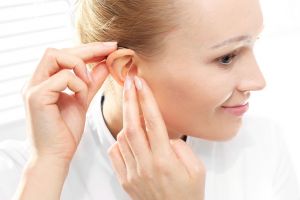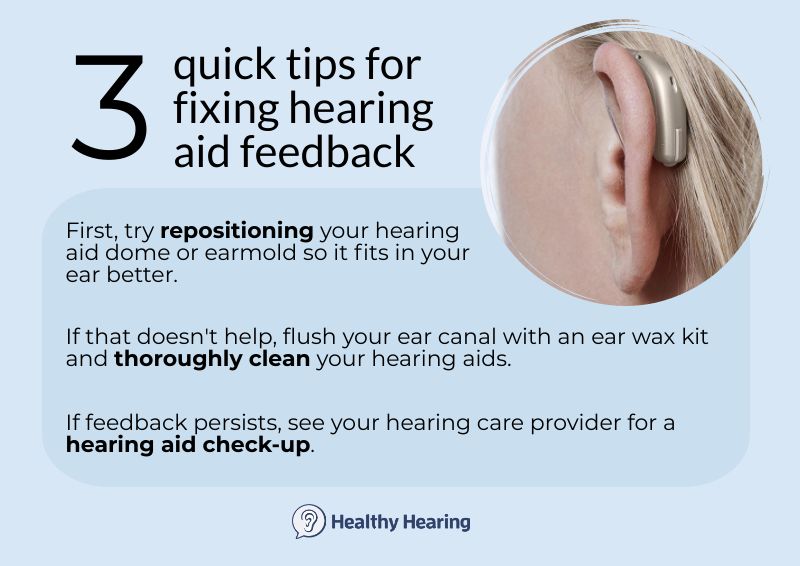|
www.HealthyHearing.com |
Hearing aid feedbackWhy it happens and how to fix it
Contributed by Joy Victory, managing editor, Healthy Hearing Key points:
Why does it happen?Hearing aid feedback is what happens when the sound coming out of the hearing aid speaker (the part that sits in your ear canal) escapes the ear canal and is picked up by the hearing aid microphone. It can sound like a squeal, screech, whistle, loud buzz or hiss. It's similar to what would happen if you were on stage and held the microphone too close to an amplifier or speaker. Troubleshooting hearing aid feedback
Although hearing aid feedback noise isn’t harmful, it can be annoying and embarrassing. If the feedback is acoustical in nature, there are a few simple things you can try to fix the problem. 1. Are you wearing them correctly?“First, make sure your hearing aid is seated properly,” says Dr. Soriya Estes of Texas-based Estes Audiology. Meaning, make sure it fits in your ear correctly. If repositioning your dome or earmold doesn’t work, she advises flushing your ear canal with an over-the-counter ear wax kit available at most drugstores or online. 2. Do you have excess ear wax?Removing excess ear wax opens up the ear canal so sound waves can travel unobstructed to the eardrum. (While you're at it, you should also make sure your hearing aids are free of wax and give them a good cleaning.) 3. When in doubt, see your providerIf you’re still experiencing feedback after you’ve tried these tips, see your hearing healthcare professional. They can check the device to see if there are any mechanical or electronic issues that need to be addressed, make sure the device fits properly and examine your ears to make sure they are clear of obstructions. In rare cases, you may need different devices, or new earmolds, since ear shapes can change with time, affecting how the hearing aids fit. More: How to troubleshoot common hearing aid problems. Hearing aid feedback problems less likely with newer devicesThe likelihood of hearing aid feedback occurring has decreased in recent years because today’s digital processors are designed to control it, Estes said. 
is key to avoiding feedback. “Feedback with the new technology rarely happens in mild to moderate hearing loss cases,” she said. “If the device is working properly, fits well and the sound waves are going into the eardrum, then you won’t have that problem. Hearing aid staticIf your hearing aid produces static, take it in for a check up. When a hearing aid produces this crackling sound, it usually means it needs service. It could be as simple as a low battery or build up of moisture or dirt. Time for new hearing aids?If your hearing aids aren't performing as well as they used to, it could be time for a new pair (here's how to know). If it's been a few years since you bought them, you may be pleasantly surprised at today's hearing aid technology. Not only is feedback far less likely, sound clarity is better than ever. Surveys consistently show that a qualified hearing care provider makes all the difference. Find a hearing instrument specialist or audiologist near you to learn more about your options. Joy Victory, managing editor, Healthy Hearing
|
Featured clinics near me
Earzlink Hearing Care - Reynoldsburg
7668 Slate Ridge Blvd
Reynoldsburg, OH 43068

Find a clinic
Need a hearing test but not sure which clinic to choose?
Call 1-877-872-7165 for help setting up a hearing test appointment.



 Joy Victory has extensive experience editing consumer health information. Her training in particular has focused on how to best communicate evidence-based medical guidelines and clinical trial results to the public. She strives to make health content accurate, accessible and engaging to the public.
Joy Victory has extensive experience editing consumer health information. Her training in particular has focused on how to best communicate evidence-based medical guidelines and clinical trial results to the public. She strives to make health content accurate, accessible and engaging to the public.